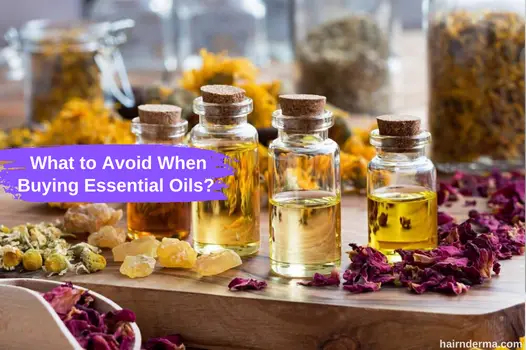If you are wondering what to avoid when buying essential oils, you are in the right place. Before diving into the fascinating world of pure-brand essential oils, you must arm yourself with the correct information.
The influx of brands and varieties has made the market exciting and overwhelming. So, what to avoid when buying essential oils? Here’s the answer:

What to Avoid When Buying Essential Oils: The Most Important Methods
What to avoid when buying essential oils, we answer in detail. Continue reading:
- Low-quality products: Not all oils are created equal by manufacturers. It is essential to look for high-quality, pure rather than synthetic oils, which can contain harmful chemicals.
- Misleading labels: Be wary of brands that boast “therapeutic grade” or “aromatherapy grade” without third-party testing. These terms aren’t regulated, and therefore, any company will use them.
- Avoid meager prices: Essential oils of good quality are often costly due to the enormous plant material required. Cheap oils indicate diluted or synthetic products.
Now that you know what to avoid when buying essential oils, choose the right brands and products.

Identifying the Best Organic Essential Oils
Finding the best organic essential oils requires careful consideration and research. Here’s what you need to keep in mind:
- Purity: Pure oils should contain no additives, fillers, or bases. Check the ingredients list to ensure the oil has only essential and perhaps a carrier oil.
- Quality: Look for oils obtained physically, such as cold pressing.
- Reputation: Buy essential oils from reputable companies that provide full transparency about their sourcing, testing, and organic certifications.
Discover the Best Non-MLM Essential Oils
Finding the best non-MLM essential oils can be daunting for those who prefer not to work with multi-level marketing (MLM) companies for their oil needs. Here are some tips:
- Check the company’s background: The company’s reputation, transparency, and commitment to quality are critical considerations.
- Sustainability: Companies should be transparent about their sustainability practices. Look for those that source their oils ethically and sustainably.
- Look for reviews: Customer reviews can be a treasure trove of information, providing insight into the scent, feel, and effectiveness of the product.
Buying essential oils is a delicate process. Making an informed decision requires time, research, and a basic understanding of the product. Remember that the best organic or pure brand essential oils are not necessarily the most expensive. Instead, these are the ones that are responsibly sourced, produced without harmful additives, and provide the therapeutic benefits you seek.
Remember, ask yourself the next time you browse for oils: What to avoid when buying essential oils?

Choosing the Best Organic Essential Oils: Certifications Matter
When selecting the best organic essential oils, certifications can be incredibly helpful in verifying the quality and organic status of the product. Here’s what you should look for:
- USDA-certified organic: This certification guarantees that the product meets the USDA’s strict organic standards.
- Ecocert certified: Ecocert is a globally recognized organic certification body, and its certification assures organic quality and sustainability.
- Non-GMO Project certified: Essential oils derived from non-GMO plants provide an additional layer of assurance regarding the purity of the product.
Experience the Benefits of the Best Non-MLM Essential Oils
For those interested in the best non-MLM essential oils, here’s why they can be a great choice:
- Quality at competitive prices: Since non-MLM companies don’t have to factor in commissions for their distributors, they can offer high-quality products at competitive prices.
- Transparent business practices: Non-MLM companies often have simple business models and pricing structures, making it easy for consumers to understand what they are paying.
Getting Value for Money with Pure Brand Essential Oils
If you are investing in pure brand essential oils, ensuring you get the best value for money is crucial. Consider the following when buying:
- Concentration: Pure oils are incredibly potent, meaning a small bottle goes a long way. While the upfront cost may seem high, remember that you will only use a few drops at once.
- Packaging: Essential oils should be sold in dark glass bottles to protect the oil from light degradation. Avoid oils stored in plastic bottles, as the oil can degrade the plastic over time and contaminate the product.
- Safety precautions: Reputable brands will provide safety information for their oils, including contraindications and maximum dilution rates. Be wary of brands that do not provide this information.
Click here for the most reliable Pure oils: https://amzn.to/3Ogel9Q
Final Advice on What to Avoid When Buying Essential Oils
As we discovered in answer to the question of What to avoid when buying essential oils, buying the right, pure brand essential oils isn’t a simple task but an art. But once you know what to avoid when purchasing essential oils, navigating the market and making the right choices becomes more accessible. Always prioritize quality, purity, sustainable sourcing, and reputable certifications.
Watch out for red flags such as low pricing, vague labeling, and lack of company transparency, and you will find that the journey to discovering the best organic essential oils or non-MLM essential oils is an enlightening experience.
Keep this guide handy for your next shopping trip, and may your journey into the aromatic world of essential oils be pure, powerful, and full of delightful discoveries!
What essential oils should you avoid?
While essential oils can offer various benefits, some should be avoided or used cautiously due to their potential adverse effects. Here are a few essential oils to be cautious about:
· Cinnamon bark oil: This can cause skin irritation and should appropriately dilute before use.
· Wintergreen oil: Contains methyl salicylate, which can be toxic if ingested or used in high concentrations.
· Eucalyptus oil: It should use carefully, as it can be toxic when ingested or cause respiratory issues if used excessively.
· Citrus oils (lemon, lime, bergamot, etc.): Can cause photosensitivity, leading to skin irritation and sunburn when exposed to sunlight.
· Peppermint oil: This may cause skin irritation, especially in sensitive individuals, and should dilute before topical use.
· Tea tree oil: Some people may experience skin irritation or allergic reactions, so performing a patch test before using it is essential.
· Thyme oil: It should be used sparingly and cautiously, as it can irritate the skin and mucous membranes.
Conduct thorough research and consult with a healthcare professional or aromatherapist before using any essential oil, especially if you have specific health conditions or concerns.
How can you tell if essential oils are fake?
Determining whether essential oils are fake can be challenging, as some counterfeit products can closely resemble genuine oils. However, here are some tips to help you identify potential fakes:
· Buy from reputable sellers: Purchase essential oils from well-known and respected brands or sellers specializing in essential oils. They are more likely to provide authentic products.
· Check the label: Look for essential oils that have a detailed title with information about the botanical name, country of origin, extraction method, and any third-party testing certifications.
· Price: If the price seems too good to be true, it might indicate a fake product. High-quality essential oils require significant plant material, so extremely cheap oils may be diluted or synthetic.
· Smell: Authentic essential oils should have a natural aroma that reflects the plant they derive from. If the scent is weak, overly sweet, or has an off-putting chemical smell, it might be a fake.
· Consistency: Genuine essential oils should have a consistent viscosity and appearance. If the oil looks cloudy, contains visible particles, or separates into layers, it could signify a fake or adulterated product.
· Bottle and packaging: Pay attention to the bottle and packaging. Reputable brands often use dark glass bottles to protect the oils from UV light. The packaging should also have proper labeling and product information.
· Batch and testing information: Legitimate essential oil manufacturers often provide batch numbers and details of third-party testing to ensure purity and quality.
· Solubility: Test the solubility of the oil in a small amount of alcohol. Authentic essential oils should dissolve well, while fake oils may leave a residue.
· Reaction to air and light: Pure essential oils are sensitive to air and light exposure. If the oil degrades rapidly or loses its potency over time, it might not be authentic.
· Research the seller: Look for reviews and feedback from other buyers to assess the seller’s reputation and the quality of their products.
If you suspect that you have purchased a fake essential oil, it’s best to contact the seller, express your concerns, and seek a refund or replacement. Additionally, reporting suspected counterfeit products to relevant authorities can help protect other consumers from falling victim to scams.


